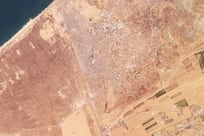ADEN // Pro-government Yemeni forces recaptured Al Misrakh district from Houthi rebels on Thursday, bringing them within 10 kilometres of Taez city.
More than 40 Houthis were killed in three days of fierce fighting for the district, south of Taez city. Following its recapture the rebels fled, leaving behind large quantities of weapons.
“The popular resistance and the army forced out the Houthis from the whole district and recaptured the public offices in the district such the police station and the district’s public offices,” said Moa’ath Al Yaseri, a leader of the Popular Resistance in Taez province.
“The liberation of Al Misrakh district is the first step to break the siege from the southern entrance of Taez city.”
Large parts of Taez city have been besieged by the rebels since last August, cutting off about 200,000 residents from much needed food, water and medical supplies.
Mr Al Yaseri said the rebels had fled west towards the rural district of Al Aqroodh, which they control, while the pro-government forces were pressing north towards Al Dhabab district, which borders Taez city.
He said a group of resistance fighters were pursuing the Houthis in Al Aqroodh after seizing a large number of Kalashnikovs and other weapons from them in Al Misrakh.
The rebels seized Al Misrakh last October to reinforce their siege on Taez by keeping pro-government forces far from the city.
But the rebels could retake the district if pro-government forces do not receive reinforcements soon from the Saudi-led military coalition, said Mohammed Al Hasani, a political analyst and former managing editor of the independent news website Al Taqeer.
The coalition, which includes the UAE, is fighting the Houthis to restore the internationally-recognised government of Abdrabu Mansur Hadi to power.
“The coalition forces and the pro-government forces have to take advantage of this advance in Al Misrakh district and reinforce the front with more troops from Aden, otherwise the Houthis will retake it,” Mr Al Hasani said.
“The Houthis know very well how to fight and they are not willing to lose Taez city, so if the coalition forces do not support the front of Al Misrakh soon, the Houthis will return to take it over in the next days.”
The capture of Al Misrakh was carried out with armoured vehicles provided by the UAE, a leading member of the coalition, but more are needed along with more troops from the Yemeni army, he said.
Since pro-government forces control the road between Al Misrakh and the southern port city of Aden, where the government has established itself the rebels were pushed out last June, the reinforcements could safely be sent along this route, he added.
The advance in Taez province came as Saudi Arabia reiterated that the coalition’s military intervention in Yemen would continue for as long as was necessary.
“It’s a matter of time before the international coalition in Yemen succeeds in restoring the legitimate government ... in control of all of Yemen’s territory,” Saudi foreign minister Adel Al Jubeir said.
“The support for the legitimate government will continue until the objectives are achieved or until an agreement is reached politically to achieve those objectives.”
However, the UN envoy to Yemen on Wednesday played down the prospects of a negotiated end to the conflict.
Ismail Ould Cheikh Ahmed told the UN Security Council that Yemen’s warring parties had so far been unable to agree on terms for a new round of peace talks, two months after holding their first face-to-face meeting.
The UN envoy said the parties were divided on “whether a new round of talks should be convened with or without a new cessation of hostilities” and were not willing to offer sufficient guarantees that a truce would hold.
“Many parts of Yemen are again witnessing air strikes and extensive ground fighting,” Mr Cheikh Ahmed said.
More than 6,100 people have been killed in nearly a year of conflict, about half of them civilians, according to the United Nations.
foreign.desk@thenational.ae
* With additional reporting from Agence France-Presse





